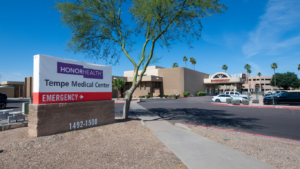Fifty years ago, Dr. Robert Flinn, a leading Arizona cardiologist, and wife Irene Flinn, a caring philanthropist, demonstrated their foresight and generosity when they created the Flinn Foundation. Today, they would no doubt both be very proud of the Foundation’s efforts to help move Arizona’s economy forward.
For many years, I’ve served on the Flinn Foundation’s Arizona Bioscience Roadmap Steering Committee and helped shape the current Roadmap, the state’s long-term strategy to advance our bioscience sector.
The Roadmap was initially launched as a 10-year plan in 2002, followed by a comprehensive study by Battelle, the world’s largest nonprofit research and development organization. The study concluded that Arizona had many of the essential elements needed to become a national leader in the area of the biosciences, but needed to strengthen its medical research base and build up a critical mass of bioscience firms and jobs. The Steering Committee concluded that all of our objectives had essentially been met in the first decade, with the exception of addressing the demand for risk capital.
Since the Roadmap was first rolled out, the biosciences and healthcare industries have undergone long overdue changes, including the rapid rise of technology. Many reasons have been cited for the slow start to the sector’s adoption of new technology, including the fact that payments to doctors and hospitals are based on the fee-for-service model. That means technologies that reduce costs or the number of patient visits actually cost providers money, disincentivizing their use.
In 2011, the Centers for Medicare & Medicaid Services began offering incentives to healthcare providers who demonstrated “meaningful use” of electronic health records (EHRs). This was a catalyst for the stimulation of the adoption of health information technology.
Today, technology is playing a front and center role in helping shape the future of healthcare with profound implications for both the healthcare industry and the patients it serves. Technology gives caregivers unprecedented opportunities to engage patients and provide excellent care, anywhere. Telehealth, remote biometric monitoring and technology-assisted health coaching are powerful tools that can help patients learn to manage diet, exercise habits and medication routines.
The era of personalized medicine comes about as technology has given doctors the ability to track an incredible amount of information about our health — right down to sequencing of our genome, the individual makeup of every person. Of course, that requires massive amounts of computing. Even Watson, IBM’s supercomputer, is jumping in to help. Watson has spent a great deal of time learning oncology and medicine, and has done analysis on the variations of the full human genome.
As the availability of information continues to rise, we’ll also continue see a rise in the critical mass of healthcare-related companies based in Arizona such as Theranos, Yulex, SynCardia Systems, Telost Biopharmaceutical and Orion Health to name just a few. Support of the Flinn Foundation’s Roadmap, which was updated in April 2014, will not only strengthen and diversify our economy, but enhance the health outcomes of the people of Arizona, both young and old.
Steven G. Zylstra is president and CEO of the Arizona Technology Council.




